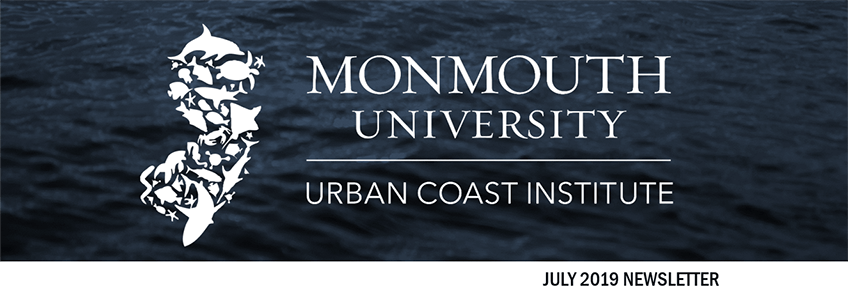
National Geographic Channel’s ‘When Sharks Attack’ Comes Aboard Monmouth’s R/V Heidi Lynn Sculthorpe
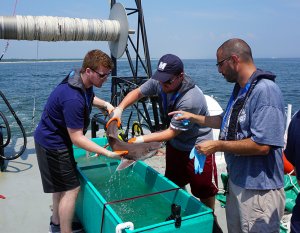 Tune in to the National Geographic Channel on Friday, July 19, at 9 p.m. for an episode of “When Sharks Attack” filmed partially aboard Monmouth University’s R/V Heidi Lynn Sculthorpe. The episode, titled “Jersey Gore,” will look back at the infamous Jersey Shore shark attacks of 1916 that inspired “Jaws” and examine theories for the causes. The crew interviewed Assistant Professor of Biology Keith Dunton aboard the vessel and observed as he and student researchers caught and tagged sharks off Sandy Hook. Check your local listings for channel information and additional airtimes.
Tune in to the National Geographic Channel on Friday, July 19, at 9 p.m. for an episode of “When Sharks Attack” filmed partially aboard Monmouth University’s R/V Heidi Lynn Sculthorpe. The episode, titled “Jersey Gore,” will look back at the infamous Jersey Shore shark attacks of 1916 that inspired “Jaws” and examine theories for the causes. The crew interviewed Assistant Professor of Biology Keith Dunton aboard the vessel and observed as he and student researchers caught and tagged sharks off Sandy Hook. Check your local listings for channel information and additional airtimes.
Offshore Wind Energy Symposium July 17 at Monmouth
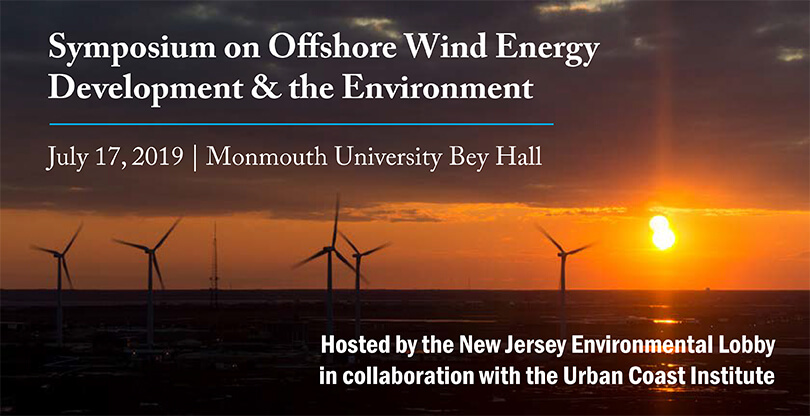
New Jersey recently granted its first award for 1,100 MW of offshore wind in federal waters. What’s next for offshore wind in the New Jersey-New York area? What are the implications for the economy, environment and marine life? Explore these issues and more at the Symposium on Offshore Wind Energy Development and the Environment, hosted by the New Jersey Environmental Lobby in collaboration with the UCI.
Speakers will include former New Jersey Gov. James Florio; representatives of state and federal agencies, environmental NGOs, and wind developers Ørsted, Equinor and Atlantic Shores; and many more. Among the discussion topics will be:
- The basics of turbine, grid and transmission infrastructure
- Wind industry panel and audience Q&A
- Siting and permitting processes
- Environmental and wildlife issues
- Update on New Jersey’s Offshore Wind Strategic Plan
- Using spatial data for siting and development
Visit the New Jersey Environmental Lobby website for a draft agenda and registration form. The symposium will be held in the Bey Hall auditorium from 9 a.m. to 5 p.m. Continental breakfast will be available before the event and a cocktail hour/networking reception will follow from 5-6:30 p.m. For more information, email njel@earthlink.net.
Callas and Phifer-Rixey Named Faculty Fellows
The Monmouth University Provost’s Office recently named Assistant Professor Kimberly Callas and Assistant Professor Megan Phifer-Rixey as the University’s inaugural Faculty Fellows. The Faculty Fellows program was established as part of the Centers of Distinction Academic Enhancement Strategic Plan. They are selected annually on a competitive basis.
Faculty members were invited to develop proposals to partner with the University’s Centers of Distinction to pursue a project with a significant scholarly, artistic, pedagogical, business or policy outcome that connects the academic department with the Center. Successful candidates receive summer stipend, some financial support for their projects, course release and support from the host Center over the duration their two-year term.
Among other work, Callas will serve as the UCI artist in residence and Phifer-Rixey as its marine genetics faculty fellow beginning in the fall semester.
Kimberly Callas
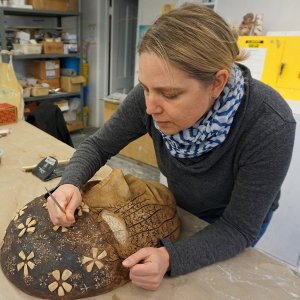 Callas joined the Department of Art and Design in 2016 and teaches courses in drawing, sculpture, and 3D design, incorporating social practice and emerging digital processes, including 3D printing, CNC milling and laser cutting. Her work has an ecological focus incorporating interdisciplinary issues including psychology, ecology and poetry.
Callas joined the Department of Art and Design in 2016 and teaches courses in drawing, sculpture, and 3D design, incorporating social practice and emerging digital processes, including 3D printing, CNC milling and laser cutting. Her work has an ecological focus incorporating interdisciplinary issues including psychology, ecology and poetry.
As an artist living in Jersey City on 9/11, Callas witnessed the Twin Towers fall from across the river and she and her husband were moved to find ways to live that were not dependent on foreign oil. They soon relocated to Maine and built and in-ground, stone house and co-founded a sustainability institute called Newforest. Callas observed that people weren’t responding to science and research presentations on sustainability the way she expected.
“I found that it was really people’s emotional connections to nature that were helping communities and individuals move more into sustainable action,” she said. “If an individual fished in a stream as a child, they would spend their evenings and weekends protecting that stream, no matter what their political leanings were.”
Building on this idea, she started Discovering the Ecological Self, a project which encourages students to explore and build connections with natural environments and create works of art inspired by them. Callas has conducted the project with at-risk youth in Monmouth County and recently continued to develop the idea through an arts residency at Joya: arte + ecología in Spain.
Through her residency with the UCI, Callas plans to immerse herself in the scientific research taking place in coastal environments at Monmouth University and share it with communities through art. She will host Discovering the Ecological Self workshops, develop her own artwork and organize a symposium with the UCI that features research on sustainability topics being conducted by University faculty.
Megan Phifer-Rixey
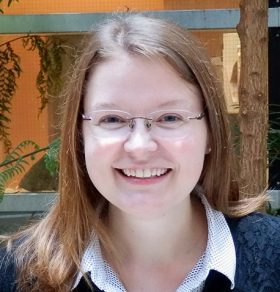 Dr. Phifer-Rixey is a member of the Biology Department, where she teaches Introduction to Cellular and Molecular Biology, Introduction to Biodiversity and Evolution, and Evolution. She earned her Ph.D. from the University of Pennsylvania and then pursued postdoctoral training at the University of Arizona and the University of California, Berkeley.
Dr. Phifer-Rixey is a member of the Biology Department, where she teaches Introduction to Cellular and Molecular Biology, Introduction to Biodiversity and Evolution, and Evolution. She earned her Ph.D. from the University of Pennsylvania and then pursued postdoctoral training at the University of Arizona and the University of California, Berkeley.
With a focus on evolutionary and population genetics, her research seeks to answer the question, “How do organisms adapt to their environment?” She also trains Monmouth students as scholars through her research courses and is active in the community, running a grant-funded genetics workshop in local schools.
Phifer-Rixey said the fellowship will provide her the opportunity to apply her skills to marine and coastal environments. She looks forward to creating opportunities for students to engage in authentic genetic research and expanding Monmouth’s work with marine environmental DNA (eDNA).
Sampling for eDNA is an approach that allows scientists to confirm the presence of fish and other organisms by testing for trace amounts of genetic material that they shed into the water. The technique holds the promise of being less expensive, more humane and more revealing than other longstanding scientific methods that rely on physically catching or observing animals. Monmouth has been collaborating with Rockefeller University on eDNA research in New York-New Jersey area coastal waters since 2016 and co-hosted the National Conference on Marine Environmental DNA in New York City last year.
“I’m already working on eDNA projects and I think we have a bit of a gap here in that we have the capacity to collect and filter the samples, but we haven’t had the capacity to do the genetic benchwork and handle the data,” she said. “There’s a real opportunity for me to help build that capacity here at Monmouth.”
Track the R/V Heidi Lynn Sculthorpe Online
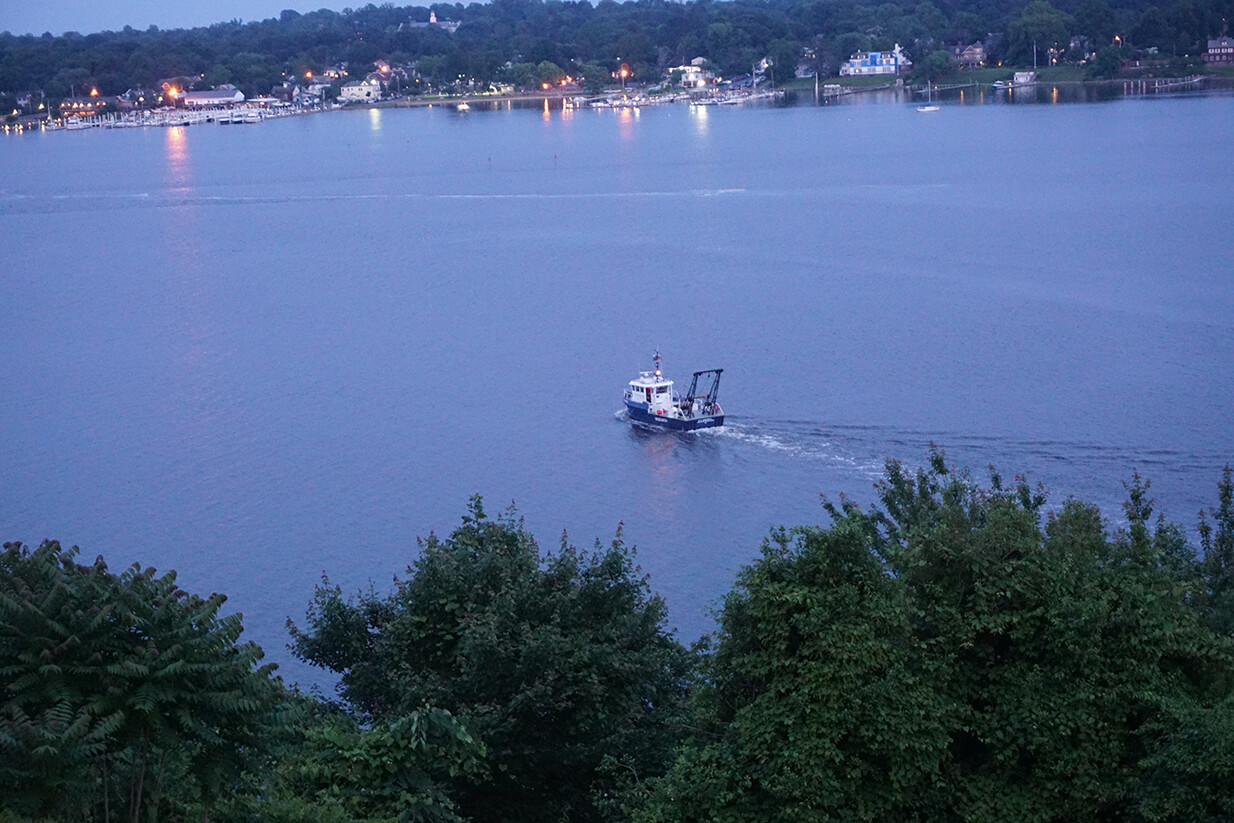
Follow the voyages of Monmouth University’s newest and largest research vessel, the Heidi Lynn Sculthorpe, in real time with an interactive map on the UCI website. Captained by UCI Marine Scientist Jim Nickels, the Heidi Lynn can regularly be seen cruising New Jersey-New York area waters conducting research trips and carrying classes. An Automatic Identification System (AIS) transponder periodically signals the position of the Heidi Lynn and other large vessels, which are aggregated and mapped by MarineTraffic.com.
Monmouth Magazine Article Highlights Environmental DNA Research
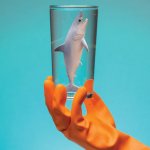 “Thanks to advances in environmental DNA (eDNA) analysis,” the University magazine Monmouth writes, “researchers like Assistant Professor of Biology Keith Dunton and his students can easily determine the presence, absence, and migration patterns of any native, invasive, endangered, or hard-to-find species in and around New Jersey’s coastal water bodies, just by dipping a cup into water.” Check out the summer issue for an article and infographic highlighting the pioneering eDNA research being conducted by Monmouth and Rockefeller universities in the New Jersey-New York region.
“Thanks to advances in environmental DNA (eDNA) analysis,” the University magazine Monmouth writes, “researchers like Assistant Professor of Biology Keith Dunton and his students can easily determine the presence, absence, and migration patterns of any native, invasive, endangered, or hard-to-find species in and around New Jersey’s coastal water bodies, just by dipping a cup into water.” Check out the summer issue for an article and infographic highlighting the pioneering eDNA research being conducted by Monmouth and Rockefeller universities in the New Jersey-New York region.
Story Map Tells a Tale of Two Shores: Sandy Hook and Eleuthera
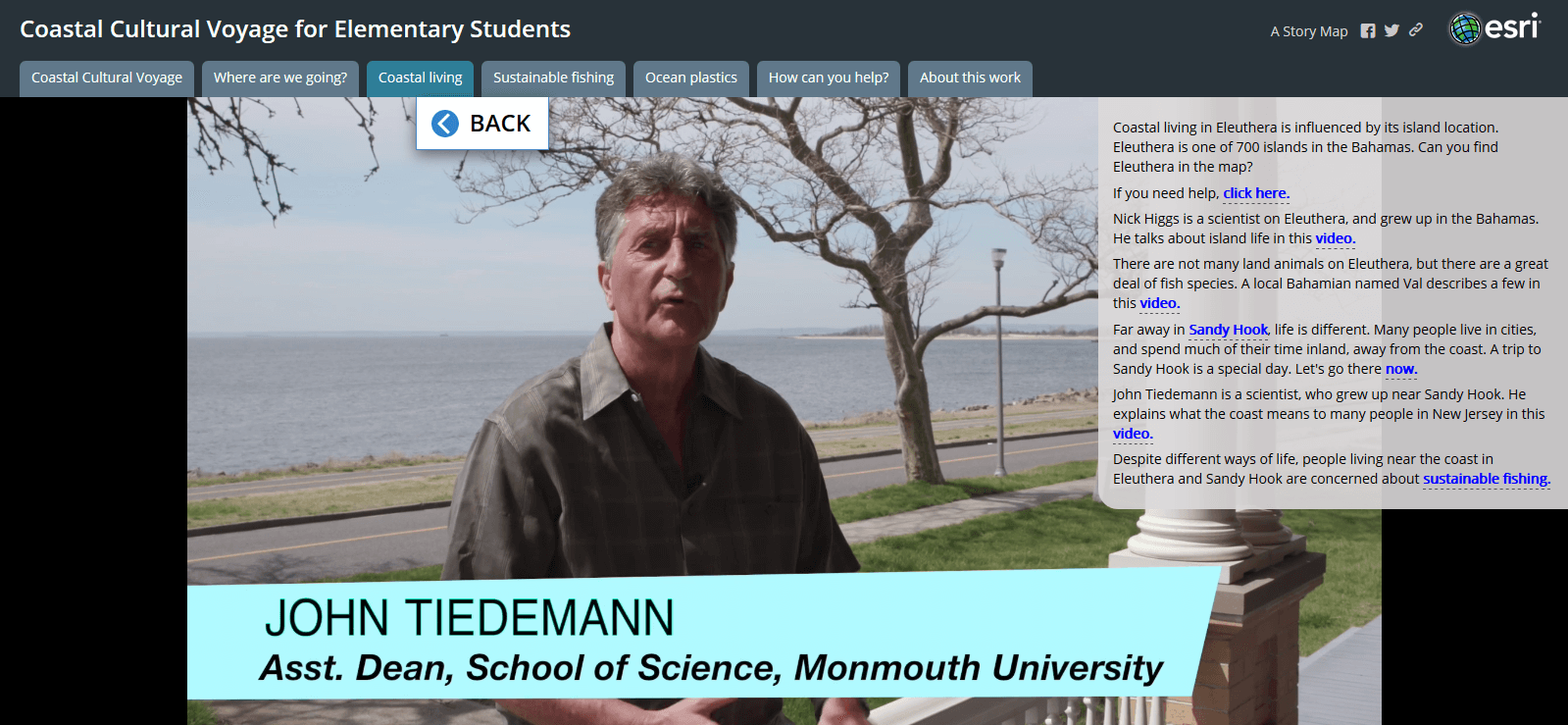
Sandy Hook, New Jersey, and Eleuthera, Bahamas, are over 1,000 miles apart, but Monmouth University GIS Program Director Geoff Fouad and communication graduate student Erin Fleming found the two coastal communities have plenty in common. While both enjoy deep cultural and economic ties to the ocean, they also share some daunting challenges – among them, the impacts of plastic pollution and overfishing.
With the support of a UCI grant, Fleming and Fouad recently completed an Arc GIS story map that compares the communities through the voices of those who live, work and play there. The project contains video interviews with experts including Monmouth University School of Science Assistant Dean John Tiedemann, scientists from NOAA’s James J. Howard Marine Sciences Laboratory at Sandy Hook, and Bahamian researchers and locals. The story map is intended as a classroom tool for elementary to high school students.
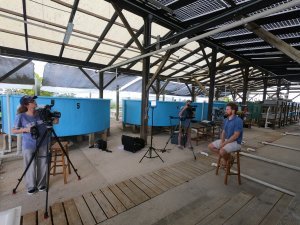 Fleming is also the director of Monmouth University Production Services, where she guides a team of students as they create video and television content for other departments on campus and external non-profit organizations. The project matched Fleming’s video production expertise with Fouad’s GIS mapping skills, and the result was a product more rich in multimedia content than what you typically find in academic story maps.
Fleming is also the director of Monmouth University Production Services, where she guides a team of students as they create video and television content for other departments on campus and external non-profit organizations. The project matched Fleming’s video production expertise with Fouad’s GIS mapping skills, and the result was a product more rich in multimedia content than what you typically find in academic story maps.
“The video content is the center and the maps complement the video content,” Fouad said. “A lot of times, geographers develop story maps and they let the maps tell the story and link it to footage that someone else created. But when you do this kind of interdisciplinary work with somebody with expertise like Erin’s, you really want to leverage that.”
Fleming said she found working with the medium to be a fun and inspiring experience.
“I could have posted these videos on YouTube but they would have just stood alone as, here’s this place and here’s this person talking about it,” she said. “But because you’re giving kids the power to click on something, to choose what they want to watch and then see a map and a place, it takes so many different disciplines and ideas and plugs them into one spot.”
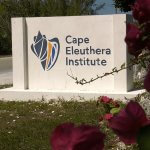 The Bahamas was chosen as Sandy Hook’s sister site in the story due to the longstanding research partnership between Monmouth University and the Cape Eleuthera Institute. Eleuthera is a long (110 miles), thin (1-mile wide in parts) island that is known for its sandy beaches, coral reefs, scenic bluffs and diverse marine life. Fleming and student Dylan McGilloway traveled to the island in the spring to conduct interviews and research the area. Monmouth students Kel Grant and Jared Garcia worked with Fleming on the Sandy Hook shoots.
The Bahamas was chosen as Sandy Hook’s sister site in the story due to the longstanding research partnership between Monmouth University and the Cape Eleuthera Institute. Eleuthera is a long (110 miles), thin (1-mile wide in parts) island that is known for its sandy beaches, coral reefs, scenic bluffs and diverse marine life. Fleming and student Dylan McGilloway traveled to the island in the spring to conduct interviews and research the area. Monmouth students Kel Grant and Jared Garcia worked with Fleming on the Sandy Hook shoots.
As part of her thesis project, Fleming will produce an online children’s video series with the footage that would serve as a companion to the story map. She said she’s interested to see which product is more effective and embraced among students. The project has left her interested in creating story maps on new topics and collaborating with other faculty experts at Monmouth.
“We have so many talented people on this campus with different skill sets and there’s ways to combine them and make these incredible new projects. I’d love to see more of that,” she said.
Prof. Abate Delivers Climate Justice Presentations on European Tour, Launches New Blog
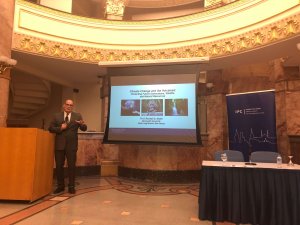 Randall S. Abate, professor in the Department of Political Science and Sociology and Rechnitz Family/Urban Coast Institute Endowed Chair in Marine and Environmental Law and Policy, delivered lectures related to his forthcoming book, “Climate Change and the Voiceless: Protecting Future Generations, Wildlife, and Natural Resources” (Cambridge University Press) in Turkey, the Netherlands, Serbia, and Spain last month. Abate’s book, which focuses on how the law can evolve to protect the interests of future generations, wildlife, and natural resources (“the voiceless”), will be published in the fall and is now available for pre-order.
Randall S. Abate, professor in the Department of Political Science and Sociology and Rechnitz Family/Urban Coast Institute Endowed Chair in Marine and Environmental Law and Policy, delivered lectures related to his forthcoming book, “Climate Change and the Voiceless: Protecting Future Generations, Wildlife, and Natural Resources” (Cambridge University Press) in Turkey, the Netherlands, Serbia, and Spain last month. Abate’s book, which focuses on how the law can evolve to protect the interests of future generations, wildlife, and natural resources (“the voiceless”), will be published in the fall and is now available for pre-order.
Abate has also launched a new blog, Climate Change(d): Reflections on Climate Change Law and Justice. The first entry describes the recent European lecture tour in detail. Abate’s blog will serve as a resource for future book tour presentations, publications, reflections, and resources on climate change law and justice.
UCI Hosts World Oceans Day Plastic Panel
By Hanan Al Asadi, UCI Communications Assistant
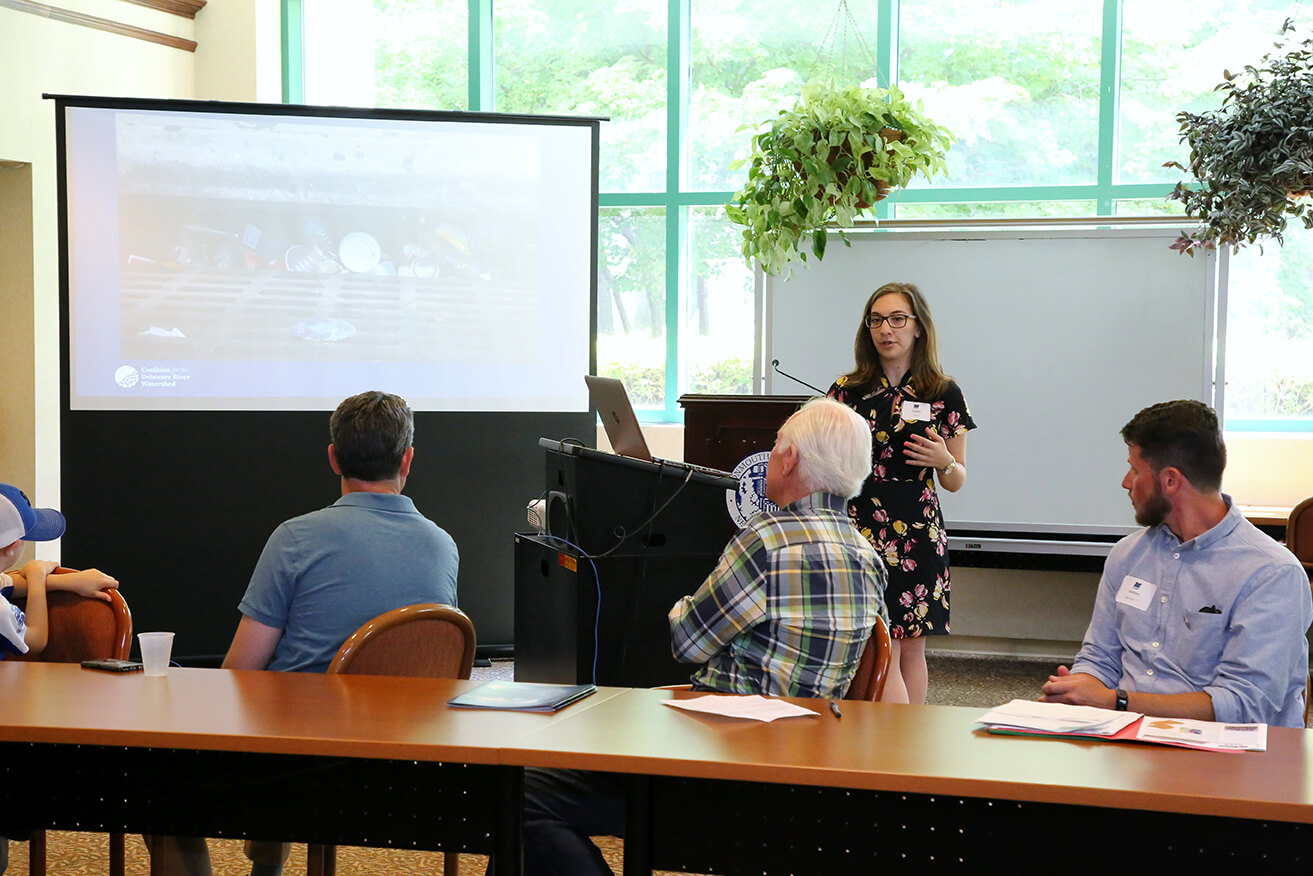
The UCI hosted a panel discussion on June 8 – celebrated internationally as World Oceans Day – exploring ways people can spread awareness about plastic pollution in the oceans and approaches they can take to reduce the magnitude of the problem.
Held in conjunction with Monmouth University Reunion Weekend, the panel included two alumni who are leaders on the ocean plastics issue in New Jersey: Coalition for the Delaware River Watershed Director Sandra Meola (’12 ’15M) and Clean Ocean Action D.W. Bennett Fellow for Coastal Advocacy Zack Karvelas (’17). The session was moderated by UCI Director Tony MacDonald.
Some of the topics discussed include the consequences of inaction, the power of everyday citizens to make a difference and the UCI’s work related to plastic pollution. The speakers stressed that everyone can and should have a role in making a change, because if the trend continues unabated, the ocean will contain more pounds of plastic than fish by 2050.
Meola introduced steps that community members can take to protect the ocean. Among them were reducing reliance on single-use plastics, contacting elected officials to urge support for policies that protect the environment, and using social media hashtags such as #NoStrawPlease and #BYObag to raise awareness.
Meola’s presentation recalled the previous century when plastic was less of a problem. Pictures were shown from the 40’s and 50’s when glass and stainless steel were alternatives to the cheap plastic abundant on today’s grocery store shelves. Although glass containers were heavy to carry around for products like shampoo bottles, she said their use helped in sustaining a clean ocean.
Karvelas pointed to the need for greater public education on recycling. Most people are unclear on which household plastics are recyclable so they put items in their bins that will not be accepted, such as plastic bags and bottle caps. This raises the risk that a waste management company will throw away the whole batch rather than spend time sorting it out. Karvelas recommended that if you’re unsure about whether something can be recycled, it is better to throw it in the trash.
Karvelas also cited beach smoking bans as an example of how a combination of good policy, public awareness and citizen mobilization can turn the tide against ocean plastics. As more and more municipalities enacted smoking ordinances in recent years, Clean Ocean Action’s beach sweeps recovered far fewer cigarette butts, he said. The state also eventually followed the towns’ lead by passing a ban that took effect this year.
MacDonald stressed that most of the plastic in the ocean comes from land. Although that means we are the cause of the problem, it also means we have the opportunity to control it and develop solutions for a plastic-free ocean.
Associated Press Coverage of Monmouth U. Surf Beach Water Quality Study
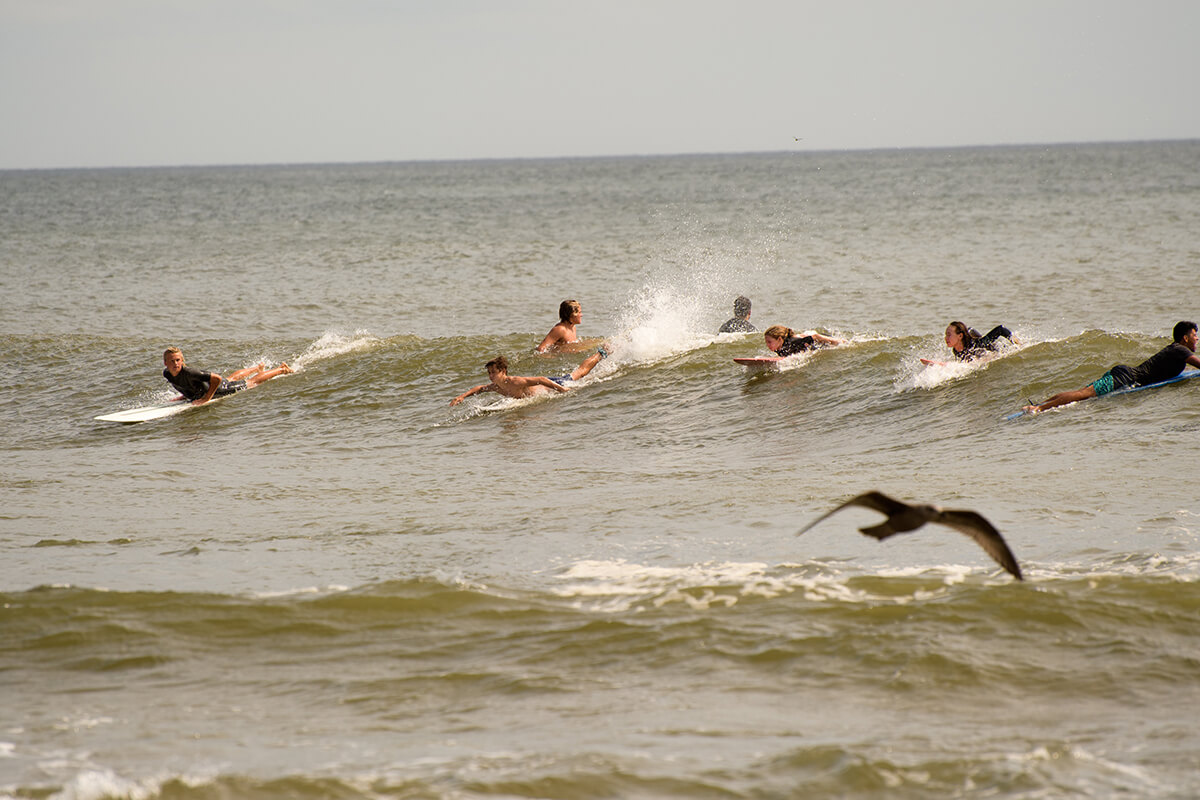
The Associated Press recently observed Monmouth University professors Jason Adolf and Jeff Weisburg and student researchers as they gathered water samples from a surfing beach in Long Branch and examined them in the lab. Their work was part of a yearlong study on the linkage between rainfall and microbial pollution at New Jersey surfing beaches where municipal storm drains and outflow pipes discharge directly into the surf zone. Read the story.
Welcome John Holler!
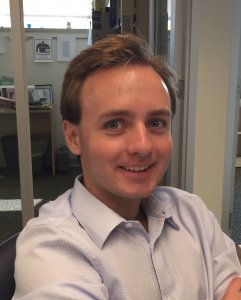 The UCI welcomes John Holler as its new administrative assistant. A Monmouth graduate who received his MBA in 2018, John has specialized team-building and financial management. For the past three years, John served as a scenic designer with the University’s Music and Theatre Arts Department, leading teams of students and faculty to construct and paint theatrical set pieces. John has also been a treasurer for the Oceanaires, a nonprofit musical organization whose chorus sings to communities throughout Ocean County. John is very excited to bring his diverse talents to the UCI team!
The UCI welcomes John Holler as its new administrative assistant. A Monmouth graduate who received his MBA in 2018, John has specialized team-building and financial management. For the past three years, John served as a scenic designer with the University’s Music and Theatre Arts Department, leading teams of students and faculty to construct and paint theatrical set pieces. John has also been a treasurer for the Oceanaires, a nonprofit musical organization whose chorus sings to communities throughout Ocean County. John is very excited to bring his diverse talents to the UCI team!
In Memoriam: Dennis Suszkowski
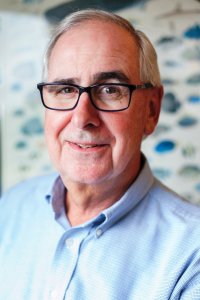
The Urban Coast Institute is saddened over the loss of our longtime Advisory Committee member, Hudson River Foundation Science Director Dennis Suszkowski. Dennis was a model of personal and professional commitment deserving of our emulation and aspiration. The UCI extends its deepest condolences to his family, friends and colleagues. Read his obituary in The New York Times.
